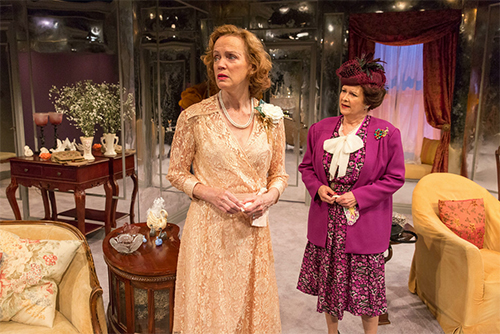By MARK BLANKENSHIP
The Fatal Weakness sneaks up on you. Superficially, George Kelly's 1946 play, about a woman discovering her husband's affair, seems like a typical pre-War comedy, with well-heeled New Yorkers snooping on each other and making droll statements about the ways of love. But the more you listen, the more you realize there's something else afoot.
For one thing, Mrs. Ollie Espenshade's response to her husband's infidelity may be quite startling, even to modern audiences. While she's certainly unhappy about it---and she enlists her friends to spy on her husband across several states---she responds to each new revelation with remarkable composure. "It's so wonderfully civil," says Jesse Marchese, who's directing the play's current revival at the Mint Theater Company. "That's surprising, but it's that much more affecting because it's so polite."
And then there's the conclusion. Without giving too much away, the final moments make a moving leap from sturdy realism into poetry, with Ollie articulating a worldview she's been developing throughout her ordeal.
"I think [Kelly] pokes a little fun at her but is also a little charmed by her," says Marchese, who's also the Mint's Associate Director. "He's generous enough to let her keep her romanticism. [By the end] she has a much more <em>informed</em> romanticism, but he doesn't kill that in her. He's charmed by it, and in turn he allows the audience to be."
This writerly charm and intelligence helped Kelly become a prominent playwright of his era. He won the Pulitzer Prize for his drama Craig's Wife and enjoyed a string of hit shows like The Torch Bearers and The Show Off. As the Mint's program note explains, he injected his most popular work with unexpected depth, "leading [critic] Mary McCarthy to observe, in 1947, that a Kelly play 'is not like anything else while on the surface it resembles every play one has ever been to.'"
The revival honors this complexity in several ways. Take Vicki R. Davis' set design, which creates Ollie's luxurious Manhattan apartment. It has the glamor you'd expect of a 1940s penthouse, but since the walls are made of mirrors, it also suggests what the characters can't see in themselves. When they try to avoid the truth by storming out, we can see their reflections as they stomp down the hall. There's no running from what's real.
"The mirrors also create this interplay between coolness and warmth," Marchese adds. "That cold, silver reflective surface against the warmth of the gold furniture speaks to something prevalent in Kelly's play. There's this real interplay of coldness and warmth in all the relationships."
Those relationships play out subtly. The entire cast delivers restrained performances, even though there are plenty of opportunities for zany comedy or barnstorming rage. "It would be easy for a character like Mabel [Ollie's snooping best friend] to chew through the scenery," says Marchese. "But it's not a style play."
It's better, he states, for the actors play their roles as naturalistically as possible, which allows the story's quirky turns to feel even more organic. "That's what Kelly is going for," he says. "It kind of goes in circles sometimes. It gets repetitive sometimes, but I think it's all an attempt to capture the way we actually speak and behave. Those repetitions are important because sometimes people aren't really listening to each other, or people are embellishing. Sometimes, they're just lying. It's all part of what makes the play so rewarding to pay attention to."
---
Mark Blankenship is TDF's online content editor
Photo by Richard Termine
